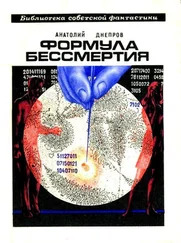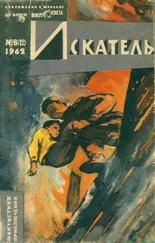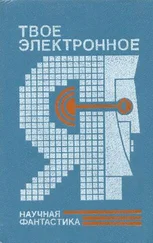Анатолий Днепров - Crabs on the island
Здесь есть возможность читать онлайн «Анатолий Днепров - Crabs on the island» весь текст электронной книги совершенно бесплатно (целиком полную версию без сокращений). В некоторых случаях можно слушать аудио, скачать через торрент в формате fb2 и присутствует краткое содержание. Город: Moscow, Год выпуска: 1968, Издательство: MIR Publishers, Жанр: Фантастика и фэнтези, на английском языке. Описание произведения, (предисловие) а так же отзывы посетителей доступны на портале библиотеки ЛибКат.
- Название:Crabs on the island
- Автор:
- Издательство:MIR Publishers
- Жанр:
- Год:1968
- Город:Moscow
- ISBN:нет данных
- Рейтинг книги:4 / 5. Голосов: 1
-
Избранное:Добавить в избранное
- Отзывы:
-
Ваша оценка:
- 80
- 1
- 2
- 3
- 4
- 5
Crabs on the island: краткое содержание, описание и аннотация
Предлагаем к чтению аннотацию, описание, краткое содержание или предисловие (зависит от того, что написал сам автор книги «Crabs on the island»). Если вы не нашли необходимую информацию о книге — напишите в комментариях, мы постараемся отыскать её.
Crabs on the island — читать онлайн бесплатно полную книгу (весь текст) целиком
Ниже представлен текст книги, разбитый по страницам. Система сохранения места последней прочитанной страницы, позволяет с удобством читать онлайн бесплатно книгу «Crabs on the island», без необходимости каждый раз заново искать на чём Вы остановились. Поставьте закладку, и сможете в любой момент перейти на страницу, на которой закончили чтение.
Интервал:
Закладка:
In the darkness I could only make out the outlines of the machines, and it seemed to me that one of the swarm looked exceptionally big. I aimed a blow at this crab. But no sooner had my crowbar come into contact with its back than I gave a scream and jumped aside: the crowbar had given me an electric shock! Somehow or other the body of this monster had been charged with electricity. "Defence as a result of evolution," crossed my mind.
Trembling all over, I approached the droning mass of machines in order to retrieve my weapon, but it was out of the question. By the flickering light of many electric arcs I saw my crowbar being cut up and the very big robot that I had intended to smash was working hardest of all.
I went back to the tent and lay down.
I soon fell into a heavy sleep, but not for long, apparently. I was suddenly wakened, feeling something cold and heavy crawling over my body. I jumped up. A crab-I 'had not realized at first what it was-disappeared in the back of the tent. A few seconds later I saw a bright electric spark. The damned crab had come into our tent in its search for metal and its electrode was cutting up the tin containing our drinking water.
I quickly shook Cookling awake and stammered an account of what had happened.
"All tins into the sea. All the grub and water into the sea!" he ordered.
We took all the tins down to the shore and laid them on the sandy bottom at a waist-deep in the water. Our tools were put in the same place.
Wet and exhausted, we sat on the beach till morning without closing our eyes. Cookling was breathing heavily, and down deep I was glad he was also suffering from his venture, for now I hated him and wished even heavier punishment for him.
I cannot remember how long had passed since our arrival on the island, but one fine day Cookling announced triumphantly: "Now the most interesting moment has arrived. All the metal's been eaten up."
In fact, we looked at all the spots where metal billets had been lying, and nothing was left. Along the shore and among the bushes could be seen empty holes.
The metal pigs, bars and rods had been turned into machines that were rushing about the island in huge numbers. Their movements had become rapid and spasmodic. Their batteries had been charged to the limit and they were not using their power for work, but were wandering aimlessly about the beach, crawling through the bushes on the plateau, running into each other, and often into us.
As I studied them I realized Cockling had been right. The crabs really were varied. They differed from each other in size, the length of their pincers, the capacity of their workshop maws. Some were more active, others less. There were probably even more profound differences in their internal structure.
"Well," said Cockling. "It's time for them to start fighting."
"Are you serious?" I asked. "Of course, I am. It will be quite enough to give them a taste of cobalt. The mechanism is so constructed that the slightest admixture of this metal will suppress, if that is the right expression for it, their mutual respect for each other."
Next morning we went to our "ocean storeroom". From the sea-bottom we fished up the usual number of tins of food and water, and four heavy grey bars of cobalt, which Cockling had kept specially for the decisive stage of the experiment.
When he waded out on to the sand, holding the cobalt bars high in the air, he was immediately surrounded by a number of crabs. They did not cross into his shadow, but one could see that the appearance of the new metal had greatly disturbed them. I was standing at a few paces away and I observed with astonishment how some of the machines were clumsily trying to jump.
"See that! What a variety of movements! How unlike they all are! And in the civil war, we'll make them wage, the strongest and fittest will survive. And they will have even more perfect progeny."
With these words Cockling threw one bar after another into the bushes.
It is difficult to describe what followed. Several machines fell simultaneously on the bars and, jostling each other, started cutting them up with electric sparks. Others crowded behind, also trying to get hold of a scrap of metal. Some climbed on to the backs of their fellows striving to get into the middle.
"Look, there's the first battle!" exclaimed Cookling happily, clapping his hands.
Within a few minutes the place where he had thrown the metal had become the arena of a terrible battle, which more and more robots came running to join.
As parts of broken up machines and bits of cobalt entered the maws of more and more machines, they turned into savage and fearless predators that immediately attacked their fellows.
During the first stage of this war the attackers were those that had tasted cobalt. It was they that cut up the robots that had come here running from all over the island in the hope of getting the metal they needed. But as more and more crabs got a taste of cobalt, the war became fiercer. And now the new-born ones, produced in the course of the battle, joined in.
This was a remarkable generation of robots- smaller in size and extraordinarily fast moving. And I was surprised that they were able to dispense with the usual process of charging their accumulators. The solar energy absorbed by the much bigger mirrors on their backs amply sufficed. They were remarkably aggressive, and attacked several crabs simultaneously cutting up two or three at a time with their sparks.
Cookling stood in the water with an expression of infinite self-satisfaction on his face, rubbing his hands and exclaiming: "Good, good! I can just imagine what's going to happen!"
As for me, I watched this battle of machines with deep disgust and fear. What would be born as a result of this struggle?
By midday the whole beach around our tent had become a vast battlefield. Robots had come from all over the island and fought in silence, without cries or screams, without shots or gunfire. Only the crackle of innumerable electric sparks and the clanking of the metal bodies of the machines gave this strange fight a peculiar rustling and grinding accompaniment.
Although most of the new generation now coming into being were squat and very mobile, other new types were nevertheless beginning to appear. These were very much larger than any of the rest. Their movements were slow, but one sensed their power, and they had no difficulty in coping with their dwarfish attackers.
As the sun began to set, a sudden change took place in the movements of the small machines; they all crowded together on the west side and began to move more slowly.
"The devil take it! That lot's doomed!" Cook-ling said in a hoarse voice. "They've got no accumulators. As soon as the sun sets, they'll be finished."
And so it was. As soon as the shadows cast by the bushes lengthened out sufficiently to cover the huge crowd of small robots, they stopped dead. They were no longer an army of aggressive predators, but a vast collection of lifeless metal boxes.
Colossal crabs, nearly half a man's height, came crawling slowly up to them and began to eat them up one by one. The outlines of even more enormous progeny could be seen on the platforms of their gigantic parents.
Cookling frowned. This was not the evolution he had wanted, that was clear. Slow-moving crab-robots of great size would be much too poor a weapon for sabotage behind enemy's lines!
While the giants were exterminating the dwarf generation, there was a temporary lull on the beach. I waded out of the water and Cookling followed me in silence. We made for the eastern side of the island in order to get some rest.
I was very tired and fell asleep almost as soon as I had stretched out on the warm soft sand.
I was awakened in the middle of the night by a terrible shriek. I could see nothing when I jumped up but the greyish strip of sand and the sea, which had merged with the black starry sky.
Читать дальшеИнтервал:
Закладка:
Похожие книги на «Crabs on the island»
Представляем Вашему вниманию похожие книги на «Crabs on the island» списком для выбора. Мы отобрали схожую по названию и смыслу литературу в надежде предоставить читателям больше вариантов отыскать новые, интересные, ещё непрочитанные произведения.
Обсуждение, отзывы о книге «Crabs on the island» и просто собственные мнения читателей. Оставьте ваши комментарии, напишите, что Вы думаете о произведении, его смысле или главных героях. Укажите что конкретно понравилось, а что нет, и почему Вы так считаете.






